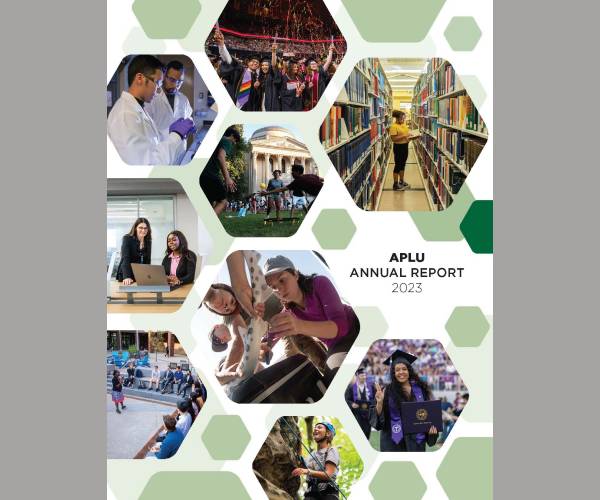Technology Transfer Evolution Working Group
APLU’s Commission on Economic and Community Engagement’s Technology Transfer Evolution Working Group explored ways in which research universities are moving beyond a revenue-driven, transactional technology transfer approach and integrating the efforts of technology management offices into the broader engagement activities of institutions and how this evolution is helping universities increase their societal relevance and respond to the economic needs of the communities they serve.
APLU’s Commission on Economic and Community Engagement‘s Technology Transfer Evolution Working Group explored ways in which research universities are moving beyond a revenue-driven, transactional technology transfer approach and integrating the efforts of technology management offices into the broader engagement activities of institutions and how this evolution is helping universities increase their societal relevance and respond to the economic needs of the communities they serve.
CECE’s Technology Transfer Evolution Working Group began its work in 2016 by framing the issues. The group noted that public research universities have a responsibility to help drive economic and social prosperity in their regions and beyond. In the context of that responsibility, the working group observed that “quickly fading are the days of technology transfer offices focusing Universities are becoming active in regional and national innovation ecosystems, preparing students for today’s disruption economy, and driving economic and social prosperity. In response, technology transfer must connect with institutions’ work to be engaged in economic, community, and talent development. The working group committed to emphasizing a redefinition of expectations by university leaders and governing boards about the purposes and success indicators for university engagement in innovation and technology transfer.
The working group was charged with the following:
- Examine the evolution of technology transfer in detail.
- Point to examples of the ways in which technology transfer is changing.
- Identify challenges or obstacles to the ongoing evolution.
- Make recommendations regarding what universities must do to continue the evolution.
The working group developed a set of five topic areas for exploration, along with key points for examination and discussion:
Engaging the Local and Regional Ecosystem
- Relationship-building with industry
- Working with government and community partners
- Innovation management in economic development
Redefining Expectations of Technology Transfer Offices
- Institutional policies to facilitate success: measurements and indicators of success, clarity of purpose, lowering barriers for rapid movement of technology to market
- Beyond patents, licensing, and transactions: linking to broader economic engagement, education, and research missions
- Partnership development across the triple helix (universities, government, and business)
Adapting Innovation Management Structures
- Aligning and connecting innovation management with industry liaison, research parks, entrepreneurship, economic development, and other related activities
- Reporting structure for different aspects of economic engagement, including where innovation management is placed in the organization, to whom it reports, and which units it directly supervises or works with laterally
- People and skill sets
Fostering an Entrepreneurial Culture
- Entrepreneurship awareness and education for faculty, staff, and students
- Connecting and aligning across entrepreneurial education efforts
- Mentoring and entrepreneurs in residence
- Institutional policy in support of entrepreneurial culture
Supporting University Startups
- Definitions of “startup,” and in particular definitions that are sufficient to encompass all relevant entrepreneurial activity
- Innovation management mechanisms for startup support (for example: incubators, accelerator programs, etc.)
- Role of innovation management in activities like demo days, business plan competitions, technology challenges, etc.
- Programs to stimulate startup formation
Responsible for economic development, tech transfer, or innovation on your campus? Join APLU’s Commission on Economic and Community Engagement. Questions regarding this report may be directed to .





Stay Connected
X (formerly Twitter)
Facebook
YouTube
LinkedIn
RSS